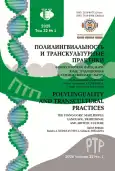Текст как средство формирования межкультурной коммуникации в языковом образовании
- Авторы: Волкова Т.А.1
-
Учреждения:
- Марийский государственный университет
- Выпуск: Том 22, № 1 (2025): ФИННО-УГОРСКИЙ НАРОД МАРИ: ЯЗЫК, ТРАДИЦИОННАЯ И ХУДОЖЕСТВЕННАЯ КУЛЬТУРА
- Страницы: 182-189
- Раздел: Билингвальное образование
- URL: https://journal-vniispk.ru/2618-897X/article/view/326881
- DOI: https://doi.org/10.22363/2618-897X-2025-22-1-182-189
- EDN: https://elibrary.ru/HWVSMQ
- ID: 326881
Цитировать
Полный текст
Аннотация
Рассматривается одна из важных проблем методики преподавания языков - формирование межкультурной коммуникации. Так как Республика Марий Эл является многонациональной, поликультурной, вопросы языкового образования приобретают особую актуальность. Анализируется роль текстов в современной межкультурной концепции преподавания языков в учебно-образовательном процессе. Подчеркивается тесная связь языка и культуры, при этом отмечается, что различия между представителями различных этносов, проявляющиеся не только на уровне знания/незнания языка, но и в других сферах, могут быть преодолены при проникновении в культуру народа. Речь идет не только об обучении иностранным языкам, но и о преподавании русского языка в условиях поликультурности и многоязычия, которые наиболее ярко проявляются в настоящее время на территории республики. Особое внимание уделено обращению к текстам различных типов, функциональных стилей при изучении дисциплины «Русский язык и культура речи». Описаны способы обращения к тексту при изучении тем «Литературные нормы русского языка», «Функциональные стили», «Культура устного и письменного делового общения», «Речевой этикет. Этика речевого общения», «Этапы подготовки и проведения публичных выступлений», «Культура дискуссии и полемики».
Ключевые слова
Об авторах
Татьяна Александровна Волкова
Марийский государственный университет
Автор, ответственный за переписку.
Email: tat.volkova2912@gmail.com
ORCID iD: 0000-0003-1630-8635
SPIN-код: 4440-5521
ResearcherId: F-5138-2014
кандидат педагогических наук, доцент кафедры общеобразовательных дисциплин и методики их преподавания
Российская Федерация, 424000, г. Йошкар-Ола, пл. Ленина, д. 1Список литературы
- Text theory. Edited by Yu.N. Zemskaya. 2010. Moscow: Flinta, Nauka publ. EDN: SDQBAL Print. (In Russ.)
- Ruseckaja, O.N. 2011. “Тext as a component of foreign language teaching content.” Vestnik Amurskogo gosudarstvennogo universiteta. Serija. Gumanitarnye nauki, no. 52. 15 Sept. 2024, https://cyberleninka.ru/article/n/tekst-kak-komponent-soderzhaniya-obucheniya-inostrannym-yazykam EDN: PZJLNL (In Russ.).
- Tareva, E.G. et.al. 2020. Intercultural education at the university: linguodidactic strategies and practices. Saint-Petersburg: Nestor-Istorija publ. Print. (In Russ.)
- Arutjunova, N.D. 1999. Language and the human world. Moscow: Languages of Russian culture. EDN: YLAWAR Print. (In Russ.).
- Krasnyh, V.V. 2002. Ethnopsycholinguistics and linguoculturology. Moscow: Gnozis. Print. (In Russ.).
- Ter-Minasova, S.G. 2000. Language and intercultural communication. Moscow: Slovo. EDN: YQOZJO Print. (In Russ.).
- Vereshhagin, E.M., and V.G. Kostomarov. 2005. Language and culture. Three linguistic concepts of foreign studies: lexical background, speech-behavioral tactics, and sapienteme. Moscow: Indrik. EDN: SDWUYH Print. (In Russ.).
- Vezhbickaja, A. 2001. Understanding cultures through keywords. Moscow: Languages of Slavic culture publ. EDN: SUMHVV Print. (In Russ.).
- Sadohin, A.P. 2005. Introduction to the theory of intercultural communication. Moscow: Higher School. EDN: QUBCDR Print. (In Russ.).
- Text as a cultural phenomenon. 1989. Novosibirsk: Science, Siberian Branch. EDN: TTPBAF Print. (In Russ.).
- Vezhbickaja, A. 2011. Semantic universals and basic concepts. Moscow: Languages of Slavic cultures. Print. (In Russ.).
Дополнительные файлы









